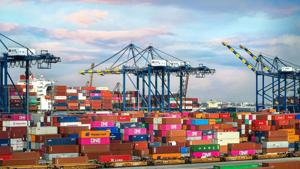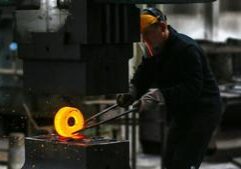
JPMorganChase to invest $10B in U.S. firms key to national security
JPMorganChase said Monday it would invest $10 billion in industries tied to U.S. national security as part of a decade-long plan to help protect the U.S. economy as global trade tensions rise.
JPMorganChase’s Security and Resiliency Initiative is a $1.5 trillion, 10-year plan “to facilitate, finance and invest in industries critical to national economic security and resiliency.” The bank will make direct equity and venture capital investments of up to $10 billion to help U.S. companies. That includes defense contractors, minerals and artificial-intelligence companies.
“It has become painfully clear that the United States has allowed itself to become too reliant on unreliable sources of critical minerals, products and manufacturing – all of which are essential for our national security,” JPMorganChase Chairman and CEO Jamie Dimon said in a statement Monday morning. “Our security is predicated on the strength and resiliency of America’s economy.”
The announcement from the largest U.S. bank comes amid rising trade tensions with China over access to rare earth minerals. Last week, Beijing tightened restrictions on the export of products containing even trace amounts of rare earth minerals. China holds most of the world’s rare earth minerals, which are crucial for advanced manufacturing, including military equipment, cars and electronics.
“America needs more speed and investment,” Dimon said. “It also needs to remove obstacles that stand in the way: excessive regulations, bureaucratic delay, partisan gridlock and an education system not aligned to the skills we need.”
Dimon’s comments come amid an ongoing partial federal government shutdown after Congress allowed funding to lapse.
The bank said its investment “comes at a time when the U.S. is looking to modernize infrastructure, fortify supply chains, and implement policies that promote growth.”
JPMorganChase will focus on supporting companies involved in supply chain and advanced manufacturing, including critical minerals, pharmaceutical supplies and robotics; defense and aerospace, including defense technology, autonomous systems, drones, next-gen connectivity and secure communications; energy independence and resilience, including battery storage, grid resilience and distributed energy; frontier and strategic technologies, including AI, cybersecurity and quantum computing. Among those four broad categories, JPMorganChase said it will 27 sub-areas including shipbuilding, nuclear energy, nanomaterials and critical defense components.
“This new initiative includes efforts like ensuring reliable access to life-saving medicines and critical minerals, defending our nation, building energy systems to meet AI-driven demand and advancing technologies like semiconductors and data centers,” Dimon said. “Our support of clients in these industries remains unwavering.”
China announced last Wednesday that foreign entities must get a license to export products containing trace amounts of rare earths found in China or made using China’s extraction process. In response, President Donald Trump on Friday said imports from China will face a new 100% tariff “over and above” existing import taxes on the world’s second-largest economy. U.S. markets dropped as tensions again rose between the two super powers.
After two fiery social media posts on Friday regarding China, Trump struck a more positive tone on Sunday.
“Don’t worry about China, it will all be fine! Highly respected President Xi just had a bad moment,” the U.S. president wrote. “He doesn’t want Depression for his country, and neither do I. The U.S.A. wants to help China, not hurt it!!!”
Dimon said speed was key: “We need to act now.”
Trump has used tariffs to quickly reorder global trade in the past seven months. Economists, businesses and some publicly traded companies have warned that tariffs could raise prices on a wide range of consumer products throughout the U.S.
Trump has said he wants to use tariffs to restore manufacturing jobs lost to lower-wage countries in decades past, shift the tax burden away from U.S. families, and pay down the national debt.
A tariff is a tax on imported goods that the importer pays, not the producer. The importer pays the cost of the duties directly to U.S. Customs and Border Protection, a federal agency.
Latest News Stories

NTU urges Congress to let temporary Obamacare tax credits end, impacting millions
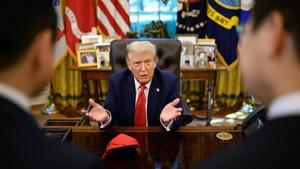
Illinois quick hits: Trump to decided on Guard deployment; alleged cartel boss indicted
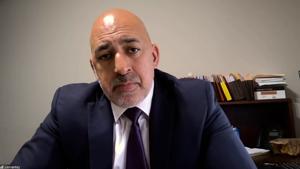
WATCH: GOP AG candidate: IL’s triplex of Democrat statewide offices ‘fails the people’

WATCH: Homan targets Chicago; Freedom Caucus responds to Pritzker’s ‘move out’ comment
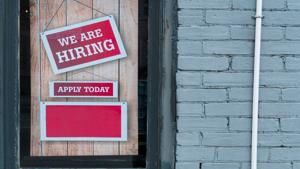
Everyday Economics: Why weak jobs data trumps inflation concerns for Fed policy
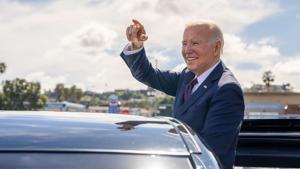
EXCLUSIVE: Secret Service spent $11 million on Hunter Biden travel detail

Proposed federal funding bill doles out nearly $16M for electric, hydrogen buses

WATCH: Democrats ‘hate’ Trump more than they ‘love’ their communities, Homan says

Bipartisan group of lawmakers aim to increase migrant physician jobs

WATCH: Border czar Homan considered turning Trump’s offer down

WATCH: DeSantis addresses State Freedom Caucus Foundation

Higher ed spending up as enrollment plummets at Illinois universities
